 W
WThe free-culture movement is a social movement that promotes the freedom to distribute and modify the creative works of others in the form of free content or open content without compensation to, or the consent of, the work's original creators, by using the Internet and other forms of media.
 W
WCopyCamp is an international conference devoted to copyright, organized in Warsaw by the Modern Poland Foundation. Representatives of cultural institutions, the media, creative sectors, academic, legal, political and non-governmental circles gather annually to discuss the influence of copyright on the circulation of cultural goods and social changes taking place all over the world.
 W
WIn video gaming, a fan translation is an unofficial translation of a video game made by fans.
 W
WFree content, libre content, or free information is any kind of functional work, work of art, or other creative content that meets the definition of a free cultural work.
 W
WThe Free Culture Forum (FCForum) is an ian international meeting of relevant organisations and individuals involved in free culture, digital rights and access to knowledge. It has been taking place in Barcelona every year since 2009, jointly with the oXcars, a free culture festival.
 W
WMayo Fuster Morell is a social researcher. Her research has focused on sharing economy, social movements, online communities and digital Commons, frequently using participatory action research and method triangulation. She has been part of the most important research centres studying Internet and its social effects, including the Berkman Center for Internet and Society, the MIT Center for Civic Media or the Berkeley School of Information. As an active citizen, she is the co-founder of multiple initiatives around digital Commons and Free Culture, such as the Procomuns Forum on collaborative economy.
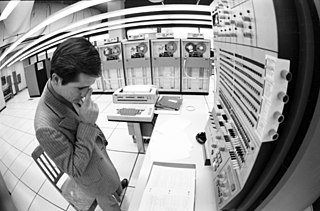 W
WIn the 1950s and 1960s, computer operating software and compilers were delivered as a part of hardware purchases without separate fees. At the time, source code, the human-readable form of software, was generally distributed with the software providing the ability to fix bugs or add new functions. Universities were early adopters of computing technology. Many of the modifications developed by universities were openly shared, in keeping with the academic principles of sharing knowledge, and organizations sprung up to facilitate sharing. As large-scale operating systems matured, fewer organizations allowed modifications to the operating software, and eventually such operating systems were closed to modification. However, utilities and other added-function applications are still shared and new organizations have been formed to promote the sharing of software.
 W
WThe Medialab-Prado, sometimes abbreviated MLP, is a cultural space and citizen lab in Madrid (Spain). It was created by the Madrid City Council in 2000, growing since then into a leading center for citizen innovation. It follows a participatory approach, using collective intelligence methods and fast prototyping tools such as fab labs, to use and co-create digital commons.
 W
WModern Poland Foundation is a Polish non-governmental organization (NGO) based in Warsaw, focused on building open educational resources, developing free digitalization technologies and influencing public policies in the field of digital rights.
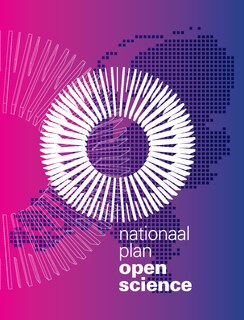 W
WThe National Platform Open Science (NPOS) – – in The Netherlands is a collaboration of 17 Dutch organisations of higher education and research intent on realising Open Science. Among its members are the Umbrella organisation of Dutch universities (VSNU), the Royal Netherlands Academy of Arts and Sciences (KNAW), the Netherlands Organisation for Scientific Research (NWO), the National Library of the Netherlands (KB), and the like. The Platform brings together the parties that have initiated, formulated, or support the National Plan Open Science, that has been presented to the Dutch government in the beginning of 2017.
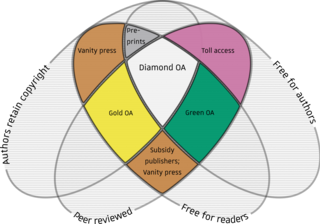 W
WDiamond open access refers to scientific articles published without charging authors for article processing charges. Alternative labels include platinum open access, non-commercial open access, cooperative open access or, more recently, open access commons. While these terms were first coined in the 2000s and the 2010s, they have been retroactively applied a variety of structure and forms of publishing from subsidized university publisher to volunteer-run cooperative that have existed for decades.
 W
WOpen access (OA) is a set of principles and a range of practices through which research outputs are distributed online, free of cost or other access barriers. With open access strictly defined, or libre open access, barriers to copying or reuse are also reduced or removed by applying an open license for copyright.
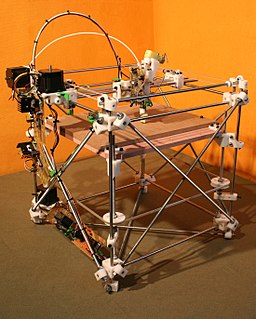 W
WThe open-design movement involves the development of physical products, machines and systems through use of publicly shared design information. This includes the making of both free and open-source software (FOSS) as well as open-source hardware. The process is generally facilitated by the Internet and often performed without monetary compensation. The goals and philosophy of the movement are identical to that of the open-source movement, but are implemented for the development of physical products rather than software. Open design is a form of co-creation, where the final product is designed by the users, rather than an external stakeholder such as a private company.
 W
WOpen education is an educational movement founded on openness, with connections to other educational movements such as critical pedagogy, and with an educational stance which favours widening participation and inclusiveness in society. Open education broadens access to the learning and training traditionally offered through formal education systems and is typically offered through online and distance education. The qualifier "open" refers to the elimination of barriers that can preclude both opportunities and recognition for participation in institution-based learning. One aspect of openness or "opening up" education is the development and adoption of open educational resources in support of open educational practices.
 W
WOpen knowledge is knowledge that is free to use, reuse, and redistribute without legal, social, or technological restriction. Open knowledge organizations and activists have proposed principles and methodologies related to the production and distribution of knowledge in an open manner. Knowledge is interpreted broadly to include data, content, and both general and scientific information.
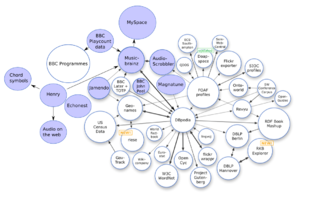 W
WOpen Data is the idea that some data should be freely available to everyone to use and republish as they wish, without restrictions from copyright, patents or other mechanisms of control. The goals of the open-source data movement are similar to those of other "open(-source)" movements such as open-source software, hardware, open content, open specifications, open education, open educational resources, open government, open knowledge, open access, open science, and the open web. Paradoxically, the growth of the open data movement is paralleled by a rise in intellectual property rights. The philosophy behind open data has been long established, but the term "open data" itself is recent, gaining popularity with the rise of the Internet and World Wide Web and, especially, with the launch of open-data government initiatives such as Data.gov, Data.gov.uk and Data.gov.in.
 W
WThe Open Source Initiative (OSI) is the steward of the Open Source Definition, the set of rules that define open source software. It is a California public-benefit nonprofit corporation, with 501(c)(3) tax-exempt status.
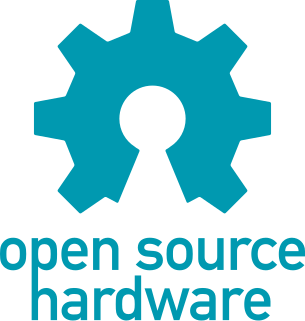 W
WOpen-source hardware (OSH) consists of physical artifacts of technology designed and offered by the open-design movement. Both free and open-source software (FOSS) and open-source hardware are created by this open-source culture movement and apply a like concept to a variety of components. It is sometimes, thus, referred to as FOSH. The term usually means that information about the hardware is easily discerned so that others can make it – coupling it closely to the maker movement. Hardware design, in addition to the software that drives the hardware, are all released under free/libre terms. The original sharer gains feedback and potentially improvements on the design from the FOSH community. There is now significant evidence that such sharing can drive a high return on investment for the scientific community.
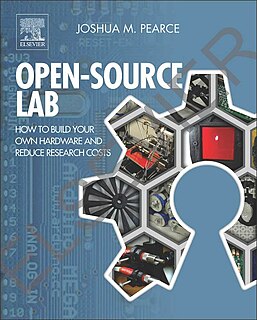 W
WThe Open-Source Lab: How to Build Your Own Hardware and Reduce Research Costs by Joshua M. Pearce was published in 2014 by Elsevier.
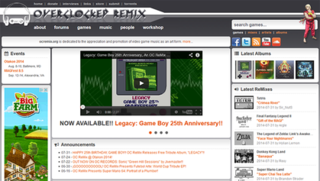 W
WOverClocked ReMix, also known as OC ReMix and OCR, is a non-commercial organization dedicated to preserving and paying tribute to video game music through arranging and re-interpreting the songs, both with new technology and software and by various traditional means. The primary focus of OC ReMix is its website, ocremix.org, which freely hosts over 4,000 curated fan-made video game music arrangements, information on game music and composers, and resources for aspiring artists. In addition to the individual works, called "ReMixes", the site hosts over 70 albums of music, including both albums of arrangements centered on a particular video game, series, or theme, and albums of original compositions for video games. The OC ReMix community created the Super Street Fighter II Turbo HD Remix soundtrack for Capcom in 2008, and began publishing commercially licensed arrangement albums in 2013.
 W
WPurism, SPC is an American computer technology social purpose corporation based in San Francisco, California and registered in the state of Washington.
 W
WRemix culture, sometimes read-write culture, is a term describing a society that allows and encourages derivative works by combining or editing existing materials to produce a new creative work or product. A remix culture would be, by default, permissive of efforts to improve upon, change, integrate, or otherwise remix the work of copyright holders. While combining elements has always been a common practice of artists of all domains throughout human history, the growth of exclusive copyright restrictions in the last several decades limits this practice more and more by the legal chilling effect. In reaction, Harvard law professor Lawrence Lessig, who considers remixing a desirable concept for human creativity, has worked since the early 2000s on a transfer of the remixing concept into the digital age. Lessig founded the Creative Commons in 2001, which released Licenses as tools to enable remix culture again, as remixing is legally prevented by the default exclusive copyright regime applied currently on intellectual property. The remix culture for cultural works is related to and inspired by the earlier Free and open-source software for software movement, which encourages the reuse and remixing of software works.
 W
WXnet is a non-profit activist platform that develops and promotes alternative models for cultural dissemination and royalty management and work in different fields related to digital rights, networked democracy and freedom of expression. Its activities revolve around five core themes: free culture, Internet neutrality, technopolitics, network democracy, new models of sustainability for the digital era and the defence of citizen journalism and the legal fight against corruption. Xnet also engages in political lobbying at the national and international levels, by preparing and submitting legislative proposals and viral campaigns. Xnet is a member of European Digital Rights (EDRi), a not-for-profit association to promote, protect and uphold civil rights in the field of information and communication technology.